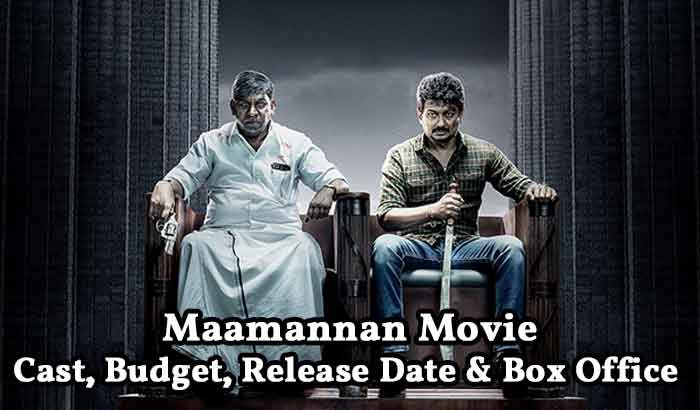You’re in a dusty Salem village, the kind where the air hangs heavy with unspoken grudges. A father, once a nobody, claws his way to power, only to watch his son stare him down with eyes full of fire—fire born from scars that never healed. That’s Maamannan in a nutshell, a film that doesn’t just tell a story; it grabs you by the collar and forces you to confront the rot beneath the surface of Indian politics. Released back in June 2023, it wasn’t just a movie for Tamil cinema fans—it was a mirror to the caste battles that simmer in every corner of our country. And honestly? Two years on, in 2025, it still feels raw, like a wound we haven’t bothered to bandage.
If you’re an Indian movie lover who’s caught wind of the buzz around Maamannan—maybe from those endless debates on its OTT drop or Vadivelu’s jaw-dropping turn—then you’re in the right spot. Directed by Mari Selvaraj, the guy who gave us the gut-punch of Pariyerum Perumal, this socio-political drama isn’t your fluffy weekend watch. It’s messy, it’s angry, and yeah, it might leave you yelling at your screen. But that’s the point. Let’s dive in, shall we? I’ll walk you through the highs, the lows, and why this film, flaws and all, deserves a spot in your queue.
Table of Contents
The Star-Studded Cast of Maamannan: Where Comedy Meets Grit
Let’s start with the people who make Maamannan breathe. The cast of Maamannan is a dream team-up that screams “event film,” but it’s no gimmick. At the heart is Vadivelu as the titular Maamannan, a Dalit MLA who’s risen from the party’s foot soldiers to a shaky throne. Vadivelu? The king of comedy? Yeah, you read that right. After years of slapstick, he sheds the laughs for a role that’s equal parts vulnerable and volcanic. Picture him in those quiet moments, eyes welling up as he sings folk tunes laced with pain—it’s the kind of performance that makes you forget Chandramukhi ever happened.
Opposite him is Fahadh Faasil as Rathnavelu, the snarling antagonist from a dominant caste family. Fahadh doesn’t just play the villain; he is the chill down your spine—arrogant, unhinged, with a temper that flares like dry tinder. Remember that opening scene where he mercy-kills his prized dog after a race loss? It’s brutal, symbolic, and sets the tone for his character’s casual cruelty. Critics raved about how Fahadh nails the entitled rage, making you hate him in the best way possible.
Then there’s Udhayanidhi Stalin as Athiveeran (or Veera), Maamannan’s estranged son—a martial arts trainer scarred by a childhood caste attack. This was Udhay’s swan song as an actor before diving full-time into politics, and damn if he doesn’t sell the simmering fury. He’s no Dhanush-level intensity, but his quiet brooding hits hard, especially in those father-son standoffs that feel ripped from real life. Keerthy Suresh rounds it out as Leela, Veera’s love interest and a fierce educator running a free coaching center. She’s the moral compass here, pushing back against the chaos with a quiet strength that grounds the film’s wilder swings.
Supporting roles shine too—think G. M. Kumar as the party chief or the ensemble of villagers who add that lived-in authenticity. It’s a cast of Maamannan that elevates the script, turning what could be preachy into profoundly human.
Read More: Coolie Movie 2025: Cast, Review, Box Office & More
Plot Breakdown: A Father’s Legacy, a Son’s Rebellion, and the Cost of Power
Spoiler-light, promise—but if you haven’t seen it, maybe pause here and grab some popcorn. Maamannan unfolds in the gritty underbelly of Salem’s politics, where the fictional Samathuva Samooganeedhi Makkal Kazhagam (SSMK) party fights for equality on paper, but caste lines blur everything.
We meet Maamannan, the everyman-turned-MLA, navigating a world that demands he bow to men like Rathnavelu, whose family pulls strings from the shadows. Enter Veera: Silent for years after a brutal childhood assault at a temple well (a sequence so visceral it’ll haunt you), he’s all bottled rage and Adimurai kicks. When Rathnavelu’s goons trash Leela’s coaching center—because, heaven forbid, free education threatens their coaching racket—Veera snaps. What starts as a petty feud explodes into a full-blown war: Destroyed pigpens (yes, pigs—symbolic as hell), unleashed dogs, and a party showdown that tests loyalties.
Mari Selvaraj weaves in metaphors everywhere—dogs for dominance, pigs for the oppressed, wells for drowning histories. The first half builds like a storm, peaking in an interval block that’s pure cinema: A single chair becomes the battlefield for dignity. The second half shifts to election frenzy, where ballots clash with brutality. Does Maamannan win the seat? Does Veera forgive his old man? It’s less about the “what” and more about the “why”—why compromise when self-respect is at stake?
It’s not perfect; the pacing dips into melodrama, and some resolutions feel too neat. But in a year of bombast like Jailer, this one’s a thoughtful gut-check on democracy’s dark side.
Maamannan OTT Release Date: From Theaters to Your Screen
If you’re like most of us, chasing that binge fix, here’s the good news: Maamannan hit Netflix on July 27, 2023, just a month after its theatrical splash. The Maamannan OTT release date was a smart move—Red Giant Movies locked in Netflix for digital rights, and it dropped in Tamil with English subs, plus a Telugu dub as Nayakudu. No waiting around; if you’re reading this in 2025, it’s been streaming for ages, racking up views from Kochi to Kolkata.
Why Netflix? It fits the film’s bold vibe—social dramas thrive there, think Sardar Udham. Satellite rights went to Zee Tamil, but OTT’s where the real conversations ignited. Pro tip: Pair it with Mari’s Karnan for a double-feature on caste cinema. Just don’t watch alone if you’re prone to heated debates.
Box Office Breakdown: A Superhit Born from Buzz and Bravery
Let’s talk numbers, because Maamannan didn’t just survive—it conquered. With a modest budget of around ₹30 crore, it roared to life on June 29, 2023, pulling in ₹15.15 crore net on day one in India alone—making it the fifth-biggest Tamil opener of the year. Tamil Nadu ate it up, with housefull shows fueled by Vadivelu’s comeback hype and Fahadh’s villain tease.
By the end of week one? Over ₹30 crore net domestically. The full run? A whopping ₹52.12 crore net in India, translating to ₹73.8 crore worldwide (including ₹12.8 crore overseas). Udhay called it his career-best grosser at a success meet, edging out his debut Oru Kal Oru Kannadi. Sure, it faced Jailer‘s shadow, but steady word-of-mouth kept it chugging—day 10 alone added ₹3.60 crore net.
Verdict? Superhit status, per trade trackers like Sacnilk. In a post-pandemic market, that’s no small feat for a “serious” film. It proved audiences crave substance when it’s served with style.
| Day | India Net (₹ Cr) | Worldwide Gross (₹ Cr) | Key Note |
|---|---|---|---|
| Day 1 | 15.15 | 20.5 | Massive Tamil Nadu opener |
| Week 1 Total | 30+ | 45 | Steady despite mixed reviews |
| Final | 52.12 | 73.8 | Udhay’s biggest hit |
Maamannan Reviews: Mixed Bag of Praise, Critique, and “Why Not More?”
Ah, the Maamannan reviews—a battlefield of their own. Critics clocked in around 3/5 stars on average, with Rotten Tomatoes at 60% fresh from a handful of takes. The Hindu hailed Vadivelu and Fahadh’s “impeccable performances” as saviors of Mari’s “weakest” effort, calling it a “politically-charged” detour that skimps on intensity. Times of India echoed: “Okayish, but hardly potent,” praising the democratic optimism but knocking the fantasy-tinged climax.
The Indian Express was harsher—2.5/5, labeling it Mari’s “rudimentary” low point, with tepid setups and generic heroics diluting the brilliance. Yet, The News Minute gave it 4/5: “Vadivelu is the soul… a superb redefinition of caste talk in Kollywood.” IMDb users averaged 6.7/10, loving the social bite but griping about pacing drags.
Audiences? Reddit’s r/kollywood split hairs—some called it “good, with a banger interval,” others “preachy but powerful.” Me? It’s Mari at his most ambitious, flaws be damned. The animal symbolism (pigs vs. dogs) lands like poetry, and AR Rahman’s score—those haunting folk tracks—elevates every frame. For a 157-minute runtime, it flies… mostly.
Pros:
- Performances that punch: Vadivelu redefines range.
- Visual metaphors: Mari’s eye for symbolism is chef’s kiss.
- Timely themes: Caste in elections? Spot-on.
Cons:
- Second-half slump: Election bits feel rushed.
- Underused Keerthy: She sparks, but fizzles.
- Predictability: You see some twists coming.
Why Maamannan Still Matters: Themes That Echo in 2025
Two years later, Maamannan isn’t dated—it’s prophetic. Mari Selvaraj, drawing from his Dalit roots (shoutout to his E-E-A-T cred via films like Karnan), dissects how power corrupts across castes. That chair scene? It’s every microaggression amplified. The father-son rift? A generational cry: Compromise or combust?
Compare it to Pariyerum Perumal (intimate romance vs. systemic hate) or Karnan (village uprising). Here, it’s institutional—ballots as weapons. Data backs the relevance: A 2023 Statista report showed caste influences 70% of rural Indian votes, mirroring the film’s frenzy.
Real-world tie-in: Udhay’s post-film pivot to TN politics? Ironic, right? Makes you wonder if art imitates life or vice versa.
Quick Comparison Table: Maamannan vs. Mari’s Other Works
| Film | Core Theme | Runtime | Avg. Review Score | Box Office Vibe |
|---|---|---|---|---|
| Pariyerum Perumal (2018) | Inter-caste love | 138 min | 8.5/10 | Cult hit |
| Karnan (2021) | Village resistance | 148 min | 7.5/10 | Steady earner |
| Maamannan (2023) | Political dignity | 157 min | 6.7/10 | Superhit surprise |
It’s a topic cluster of Tamil new wave cinema—link it to our guide on Mari Selvaraj’s Evolution for deeper dives.
FAQ: Your Burning Questions on Maamannan, Answered
Is Maamannan based on a true story?
Not directly, but Mari pulls from real caste violence in Tamil Nadu—like temple well attacks. It’s fiction with truth serum.
Who wins the election in Maamannan?
No spoilers! But let’s say the ending flips expectations—democracy’s messy, after all.
Maamannan vs. Jailer: Which is better?
Apples and elephants. Maamannan for brains, Jailer for brawn. Dual-watch ’em.
Where can I download Maamannan songs?
AR Rahman’s tracks like “Rasa Kannu” are on Spotify or JioSaavn. (Suggest: Download our free Tamil OST playlist for offline vibes.)
Did Vadivelu win awards for Maamannan?
Nods at Filmfare and more—his best dramatic turn yet.
Wrapping It Up: Why Maamannan Deserves Your Next Movie Night
Look, Maamannan isn’t the cleanest ride—it’s bumpy, it’s biased toward hope in a hopeless system, and yeah, it might make you uncomfortable. But that’s cinema’s job, isn’t it? In a world where movies often dodge the hard stuff, Mari Selvaraj and his powerhouse cast serve it straight: Dignity isn’t given; it’s demanded. Vadivelu’s tears, Fahadh’s snarls, that killer score—they linger long after the credits.
If this sparked something, hit play on Netflix tonight. Need more Tamil deep cuts? Check our full guide to 2023’s Socio-Political Hits. Or join the chat in our free Slack community—drop your hot takes on that interval block. What’s your verdict: Compromise or fight? Let’s talk.










